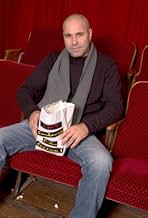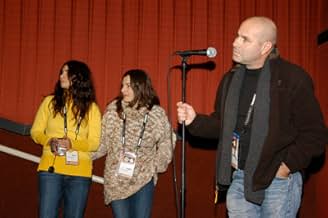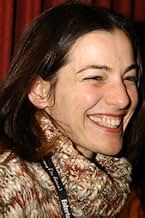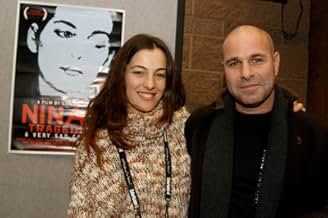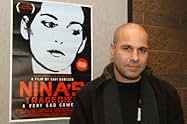अपनी भाषा में प्लॉट जोड़ेंThe taboo relationship between young Nadav and his Aunt Nina transcends definition on its way to odd highs and lows.The taboo relationship between young Nadav and his Aunt Nina transcends definition on its way to odd highs and lows.The taboo relationship between young Nadav and his Aunt Nina transcends definition on its way to odd highs and lows.
- पुरस्कार
- 11 जीत और कुल 2 नामांकन
Evgenia Dodina
- Galina
- (as Yevgeniya Dodina)
Yaakov Yaakobson
- Ivi
- (as Yankale Yaakobson)
Jonathan Cherchi
- Key waiter
- (as Yonatan Cherchi)
फ़ीचर्ड समीक्षाएं
I just saw this at the San Francisco Jewish Film Festival and loved it. It didn't feel like most movies I've seen lately. It didn't try to make the main character change for the better. It accepted all the flaws and moved on, focusing on the story. I loved all the connections and the fact that it's advertised to be "a very sad comedy" is exactly right. it is hilarious at some parts, and you want to cry at others, but it works. it's real. i loved it. beautiful cinematography and acting. Another thing i liked about the movie was it was genuinely from a little boy's point of view. when he has the dream with the man's voice becoming a telephone ring, that was priceless and clearly something that a little child would dream because it would be stuck in their heads. great movie. see it :)
"Nina's Tragedies (Ha-Asonot Shel Nina)" is a charming mix of genres.
It's a coming of age story of a young teen boy (played very age appropriately with wide-eyed naiveté by Aviv Elkabeth) who acutely observes his dysfunctional family and their friends without really comprehending their adult emotions.
It's also a sophisticated urban comedy about artists and intellectuals that we are more used to seeing in movies set in Paris or New York, including a fashion designer, a book editor, photographer, sculptor and nudist performance artist.
The casual fillips that make us know they live in Tel Aviv add unique ramifications, as one character is killed while serving in the Army reserves (which for non-Israelis gives the film a post-9/11 overlay) and another gets caught up in ecstatic Orthodox Judaism.
It also capitalizes on unusual twist of fate relationships, as portrayed in such movies as "Next Stop Wonderland" where we think we are watching magic realism but it turns out to be grounded in coincidence.
The boy's desperate crush on his beautiful aunt is the mechanism to link the stories, as his voyeurism becomes a metaphor for the viewer and for artists in general, almost a bit too preciously as the boy is, as in most every such film, a budding writer.
The film combines cheerfully earthy and frank sexuality with intense romantic longing, so it is a much more ironic view of grief than the Israeli film "Broken Wings (Knafayim Shvurot)" that was released in the U.S. last year. There's a long kiss that matches TV's most sensual kiss of the season in "Lost" with beautiful cinematography of temporary fulfillment. The primarily night-time cinematography is lovely.
The acting is wonderful, particularly Ayelet Zurer as the strikingly lovely aunt who has intense chemistry in contrast with the solidity of craggy-faced Alon Abutbul. Anat Waxman makes the quirky mother a real person, not a silly joke. The concluding coda seems too much wishful thinking, even if it is emotionally satisfying.
The credits are not translated into English and many of the subtitles are white on white.
It's a coming of age story of a young teen boy (played very age appropriately with wide-eyed naiveté by Aviv Elkabeth) who acutely observes his dysfunctional family and their friends without really comprehending their adult emotions.
It's also a sophisticated urban comedy about artists and intellectuals that we are more used to seeing in movies set in Paris or New York, including a fashion designer, a book editor, photographer, sculptor and nudist performance artist.
The casual fillips that make us know they live in Tel Aviv add unique ramifications, as one character is killed while serving in the Army reserves (which for non-Israelis gives the film a post-9/11 overlay) and another gets caught up in ecstatic Orthodox Judaism.
It also capitalizes on unusual twist of fate relationships, as portrayed in such movies as "Next Stop Wonderland" where we think we are watching magic realism but it turns out to be grounded in coincidence.
The boy's desperate crush on his beautiful aunt is the mechanism to link the stories, as his voyeurism becomes a metaphor for the viewer and for artists in general, almost a bit too preciously as the boy is, as in most every such film, a budding writer.
The film combines cheerfully earthy and frank sexuality with intense romantic longing, so it is a much more ironic view of grief than the Israeli film "Broken Wings (Knafayim Shvurot)" that was released in the U.S. last year. There's a long kiss that matches TV's most sensual kiss of the season in "Lost" with beautiful cinematography of temporary fulfillment. The primarily night-time cinematography is lovely.
The acting is wonderful, particularly Ayelet Zurer as the strikingly lovely aunt who has intense chemistry in contrast with the solidity of craggy-faced Alon Abutbul. Anat Waxman makes the quirky mother a real person, not a silly joke. The concluding coda seems too much wishful thinking, even if it is emotionally satisfying.
The credits are not translated into English and many of the subtitles are white on white.
This film is much more sophisticated than the average Israeli movie, with a thoughtful script, excellent production values, and decent acting. It even unfolds slightly out of sequence, an arty touch that some might find confusing, though everything comes together nicely at the end. It's not just a good movie by Israeli standards, but by any standards. With movies like this one, and Broken Wings, the Israeli cinema is demonstrating a new level of vitality and professionalism.
This movie is narrated by Nadav, a pubescent boy who has a crush on his beautiful aunt, but the focus isn't on young lust as capsule descriptions might lead you to believe. It's much more about the difficulty of growing up and coming to terms with the problems of the adult world, and with the human frailties of your loved ones. And his family is a wacky bunch. Dad has dropped out and joined a bunch of religious fanatics/ecstatics. Mom is a flighty fashion designer who has a new boyfriend every week. And aunt Nina is a recent widow whose grief sometimes separates them, and sometimes brings them closer.
In his struggle to understand the adult world, Nadav occasionally turns to peeping through windows, a practice the director tries to portray as an offshoot of his sensitive, inquiring mind. Some viewers may find it a bit creepy, particularly because of his partner in crime, a socially inept adult named Menahem (played with great comic effect by Dov Navon). But that, too, is a small part of the plot, and since we're peeping at the same things he is, we're in no position to cast stones.
Along with the problems of adult life, the film portrays lots of the small moments that make it so rich and interesting as well. These incidents in the lives of the various characters may be absurd, but they also have the ring of truth about them.
Nadav acts childishly throughout the film, refusing to talk to family members he loves, but that he feels have betrayed him. He comes around in the end, though, and in the heartwarming climax he accepts them with their faults, just as he comes to see that they also accept him with his.
This movie is narrated by Nadav, a pubescent boy who has a crush on his beautiful aunt, but the focus isn't on young lust as capsule descriptions might lead you to believe. It's much more about the difficulty of growing up and coming to terms with the problems of the adult world, and with the human frailties of your loved ones. And his family is a wacky bunch. Dad has dropped out and joined a bunch of religious fanatics/ecstatics. Mom is a flighty fashion designer who has a new boyfriend every week. And aunt Nina is a recent widow whose grief sometimes separates them, and sometimes brings them closer.
In his struggle to understand the adult world, Nadav occasionally turns to peeping through windows, a practice the director tries to portray as an offshoot of his sensitive, inquiring mind. Some viewers may find it a bit creepy, particularly because of his partner in crime, a socially inept adult named Menahem (played with great comic effect by Dov Navon). But that, too, is a small part of the plot, and since we're peeping at the same things he is, we're in no position to cast stones.
Along with the problems of adult life, the film portrays lots of the small moments that make it so rich and interesting as well. These incidents in the lives of the various characters may be absurd, but they also have the ring of truth about them.
Nadav acts childishly throughout the film, refusing to talk to family members he loves, but that he feels have betrayed him. He comes around in the end, though, and in the heartwarming climax he accepts them with their faults, just as he comes to see that they also accept him with his.
One of the most common errors in film reviewing is mistaking "Realistic" with "Genuine". For example, a movie might be considered realistic because it depicts a harsh environment, poverty, crime and all the other features that are a part on any country but it will be completely not genuine because the characters are shallow, stereotypical and the plot would just too dramatic to actually occur like a 16 year old who becomes a drug baron or something (sweet 16 comes to mind as an example).
On the other hand, there are films who arre not very (or even remotely) realistic but they're genuine because their feelings and lines (in the dialogue, enough about drugs) are something we can all relate to. films that are genuine could be: Jerry Mcquire, His girl friday, Trainspotting, se7en etc. I am happy to say that Nina's tragedies, although nowhere near as good as those masterpieces, definitely earns its place in the Genuine hall of fame.
The movie, in short, tells the tale of Nadav, a 14 year old kid who reminisces 6 months of his life, beginning from the death of his aunt's husband up to his father's death. His aunt, Nina ( portrayed by Ayelet Zorer, in my opinion, the Israeli equivalent of Maryl Streep)is shattered and Nadav is asked by his mother to move in with her and Nadav who is secretly infatuated with Nina, is more than happy to be a shoulder to cry on.
Unfortunately, Nadav's already complex plot thickens even more when his father who became a fanatic religious a couple of years ago, falls ill with cancer and wants to reconcile with his estranged son while into Nina's life enters an eccentric photographer (Alon Aboutboul). Nadav is about to face every demon he has in the next six months and in the worst possible time- when he reaches puberty.
The movie is magnificent, it boasts great acting and script but most of all, it has those little scenes that are seemingly insignificant but they are the scenes that make us want to rent it again and again.
8.5 out of 10 in my FilmOmeter. The best Israeli film of 2003, so far.
On the other hand, there are films who arre not very (or even remotely) realistic but they're genuine because their feelings and lines (in the dialogue, enough about drugs) are something we can all relate to. films that are genuine could be: Jerry Mcquire, His girl friday, Trainspotting, se7en etc. I am happy to say that Nina's tragedies, although nowhere near as good as those masterpieces, definitely earns its place in the Genuine hall of fame.
The movie, in short, tells the tale of Nadav, a 14 year old kid who reminisces 6 months of his life, beginning from the death of his aunt's husband up to his father's death. His aunt, Nina ( portrayed by Ayelet Zorer, in my opinion, the Israeli equivalent of Maryl Streep)is shattered and Nadav is asked by his mother to move in with her and Nadav who is secretly infatuated with Nina, is more than happy to be a shoulder to cry on.
Unfortunately, Nadav's already complex plot thickens even more when his father who became a fanatic religious a couple of years ago, falls ill with cancer and wants to reconcile with his estranged son while into Nina's life enters an eccentric photographer (Alon Aboutboul). Nadav is about to face every demon he has in the next six months and in the worst possible time- when he reaches puberty.
The movie is magnificent, it boasts great acting and script but most of all, it has those little scenes that are seemingly insignificant but they are the scenes that make us want to rent it again and again.
8.5 out of 10 in my FilmOmeter. The best Israeli film of 2003, so far.
A lonely, bookish 14 year old boy, Nadav is infatuated with his Aunt Nina, his mother's younger sister. When her husband is killed in a terrorist attack only a couple of months after their marriage, Nina is devastated. Fearing the worst, Nadav is sent by his mother to be with her. So begins 'the happiest days of his life, so far.'
The problem is that Nadav, in his innocence and naivety, believes this to be the beginning of something much more. Nina herself is oblivious to this, seeing only a loving nephew and young boy. Seen through Nadav's eyes, we witness the slightly bizarre reality of the world around him Nina coming to terms with her grief, his parents dealing with their separation and his father's illness, his best friend (Menachem a much older man) dealing with his budding relationship with Galina.
While under-stated, Nina's Tragedies is a genuine mix of comedy, pathos, anger and sadness (but thankfully avoiding melodramatic pitfalls), has fully-rounded characters, a tight script and a uniformly excellent cast. It is understandable why the film won eleven Israeli Film Awards in 2003 (including Best Feature).
The problem is that Nadav, in his innocence and naivety, believes this to be the beginning of something much more. Nina herself is oblivious to this, seeing only a loving nephew and young boy. Seen through Nadav's eyes, we witness the slightly bizarre reality of the world around him Nina coming to terms with her grief, his parents dealing with their separation and his father's illness, his best friend (Menachem a much older man) dealing with his budding relationship with Galina.
While under-stated, Nina's Tragedies is a genuine mix of comedy, pathos, anger and sadness (but thankfully avoiding melodramatic pitfalls), has fully-rounded characters, a tight script and a uniformly excellent cast. It is understandable why the film won eleven Israeli Film Awards in 2003 (including Best Feature).
क्या आपको पता है
- कनेक्शनFeatured in Night Therapy: Zman Lalechet (2024)
टॉप पसंद
रेटिंग देने के लिए साइन-इन करें और वैयक्तिकृत सुझावों के लिए वॉचलिस्ट करें
- How long is Nina's Tragedies?Alexa द्वारा संचालित
विवरण
- रिलीज़ की तारीख़
- कंट्री ऑफ़ ओरिजिन
- आधिकारिक साइट
- भाषा
- इस रूप में भी जाना जाता है
- Nina'nın Felaketleri
- उत्पादन कंपनी
- IMDbPro पर और कंपनी क्रेडिट देखें
बॉक्स ऑफ़िस
- US और कनाडा में सकल
- $2,38,831
- US और कनाडा में पहले सप्ताह में कुल कमाई
- $24,456
- 27 मार्च 2005
- दुनिया भर में सकल
- $2,38,831
- चलने की अवधि1 घंटा 46 मिनट
- रंग
इस पेज में योगदान दें
किसी बदलाव का सुझाव दें या अनुपलब्ध कॉन्टेंट जोड़ें


